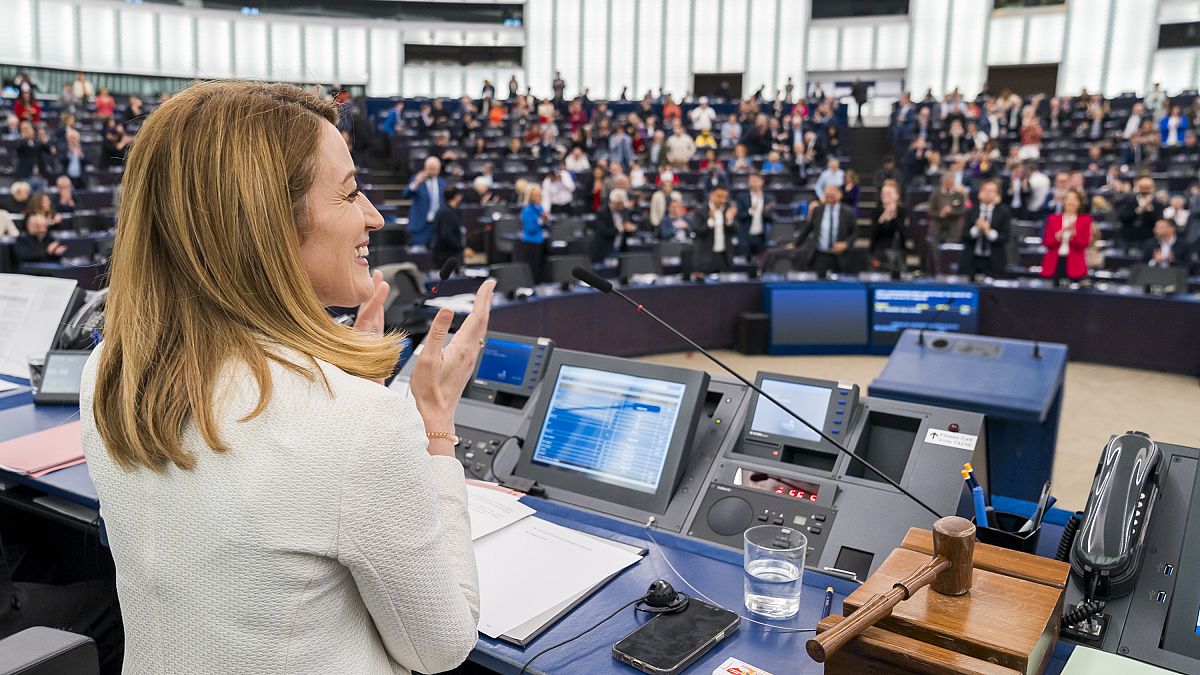Centre-right EPP grabs key jobs in first Parliament allotment

The European Parliament’s political groups have each earmarked preferred choices for committee chairs, with the centre-right EPP taking leading roles and socialists targeting other key posts.
Political groups in the European Parliament have begun dividing key roles ahead of next week’s inaugural session, with the centre-right European People’s Party (EPP) earmarking key roles, according to an internal document seen by Euronews.
In a meeting last night, each political group took turns picking their preferences for chairmanships of committees and sub-committees, starting with the largest delegation and applying a proportional formula granting groups more clout relative to their size.
The EPP which won the most seats at the EU elections, has secured chairmanships of three top committees – Industry (ITRE), Foreign Affairs (AFET), and Agriculture (AGRI). It is also seeking leadership of the Constitutional Affairs (AFCO), Fisheries (PECH) and Budgetary Control (CONT) committees, and of the sub-committee on Public Health (SANT).
The Socialists & Democrats (S&D) asked for leadership of the influential Environment, Public Health, and Food Safety (ENVI) committee, which, alongside ITRE, is the largest in the European Parliament with 90 members. The group also aims to chair the International Trade (INTA), Economic and Monetary Affairs (ECON), Regional Development (REGI) and Women’s Rights and Gender Equality (FEMM) committees.
The European Conservatives and Reformists (ECR), the third-largest group as of the July 4 deadline for group constitution, sought chairmanship of the Budgets (BUDG) committee, critical for managing the EU’s long-term budget. The group also sought leadership of the Civil Liberties, Justice, and Home Affairs (LIBE) and Petitions (PETI) committees.
The fourth largest group at the time of the 4 July deadline – its position has subsequently been superseded by Patriots of Europe, now the third largest group – liberals of Renew Europe (RE) aimed to chair smaller but influential committees such as Development (DEVE), Legal Affairs (JURI), and the sub-committee on Security and Defence (SEDE).
The Greens are pushing for leadership of the Internal Market and Consumer Protection (IMCO) and the Human Rights sub-committee (DROI). The Left group is seeking control of the Tax Matters (FISC) and Employment and Social Affairs (EMPL) committees.
The Patriots group is involved in the power-sharing despite missing the July 4 deadline and managed to claim the Transport and Tourism (TRAN) and Culture and Education (CULT) committees. However, most political groups are applying a cordon sanitaire against far-right parties, excluding them from influential positions in Parliament.
Each committee will formally elect later this month a chair and up to four vice-chairs in its constitutive meeting, forming the committee Bureau. While candidates have been informally assigned using the proportional d’Hondt method, they can still be voted down by committee members.
Due to the cordon sanitaire, the high-level positions informally assigned to the far-right group are therefore expected to remain vacant and may be reassigned to other groups at a later stage.
Related
ForexLive European FX news wrap: Euro stays buoyed, markets wait…
Headlines:Markets:EUR leads, AUD lags on the dayEuropean equities lower; S&P 500 futures up 0.1%US 10-year yields down 2.7 bps to 4.255%Gold up 0.4% to $2,9
European shares fall as tariff uncertainties weigh; US jobs data…
(Reuters) - European shares fell on Friday as frequent shifts in U.S. trade policy throughout the week resulted in risk aversion, while focus remained on th
US economy added 151,000 new jobs in February; Euro on…
US jobs report releasedNEWSFLASH: Hiring across the US economy picked up slightly at the start of Donald Trump’s second term in office.The US economy added 15












